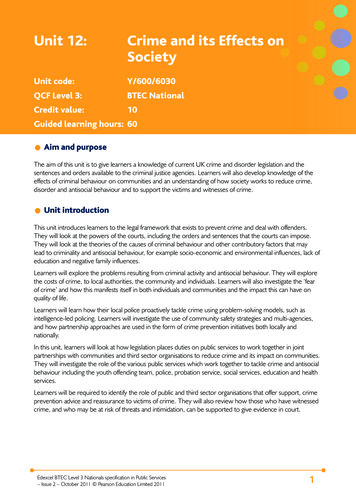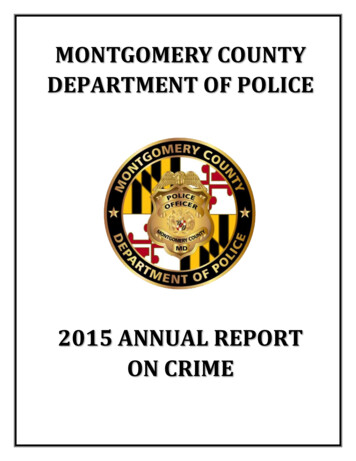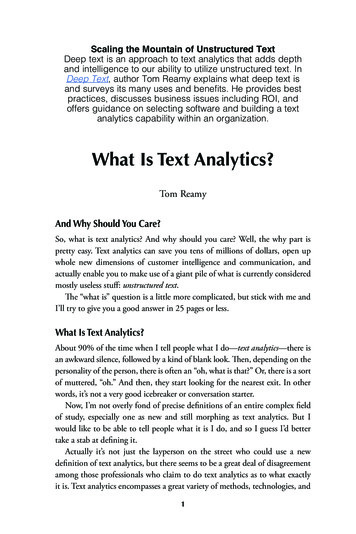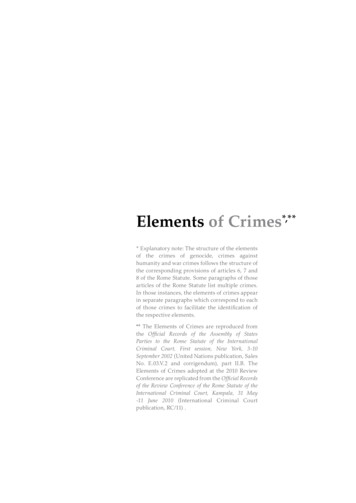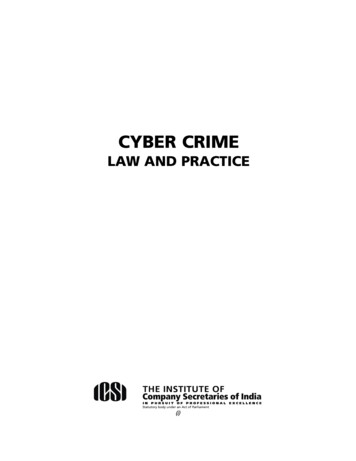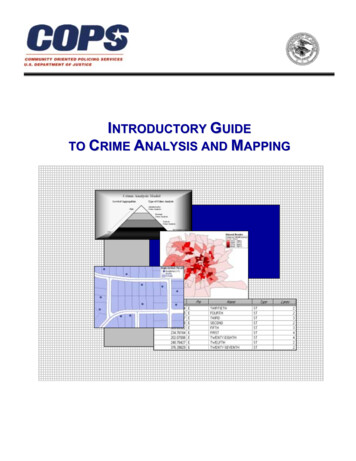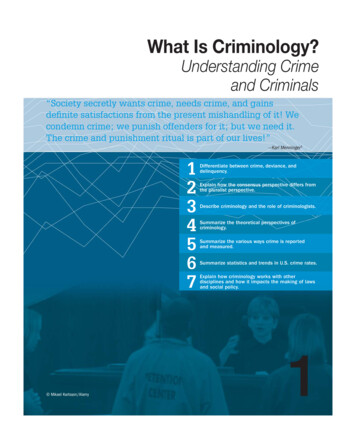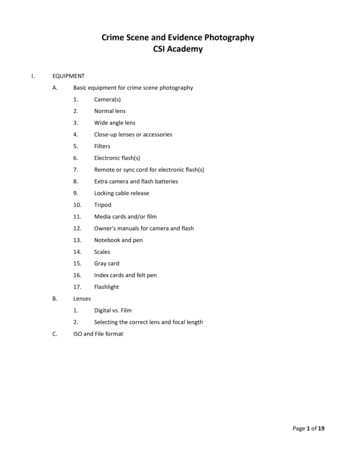
Transcription
Copyright 2016 by Trevor NoahAll rights reserved.Published in the United States by Spiegel & Grau, an imprint of Random House, a division of PenguinRandom House LLC, New York.SPIEGEL & GRAU and Design is a registered trademark of Penguin Random House LLC.Library of Congress Cataloging-in-Publication DataNames: Noah, Trevor, author.Title: Born a crime: stories from a South African childhood / by Trevor Noah.Description: First edition. New York : Spiegel & Grau, 2016.Identifiers: LCCN 2016031399 ISBN 9780399588174 ISBN 9780399590443 (international) ISBN9780399588181 (ebook)Subjects: LCSH: Noah, Trevor Comedians—United States—Biography. Comedians—South Africa—Biography. Television personalities—United States—Biography.Classification: LCC PN2287.N557 A3 2016 DDC 791.4502/8092 [B]—dc23 LC record available athttps://lccn.loc.gov/ 2016031399Ebook ISBN 9780399588181spiegelandgrau.comBook design by Susan Turner, adapted for ebookCover design: Greg MollicaCover image: Mark Stutzman, based on a photograph by Kwaku Alston (Trevor Noah); Getty Images(background)v4.1ep
ContentsCoverTitle PageCopyrightImmorality Act, 1927Part IChapter 1: RunChapter 2: Born a CrimeChapter 3: Trevor, PrayChapter 4: ChameleonChapter 5: The Second GirlChapter 6: LoopholesChapter 7: FufiChapter 8: RobertPart IIChapter 9: The Mulberry TreeChapter 10: A Young Man’s Long, Awkward, Occasionally Tragic, and FrequentlyHumiliating Education in Affairs of the Heart, Part I: Valentine’s DayChapter 11: OutsiderChapter 12: A Young Man’s Long, Awkward, Occasionally Tragic, and FrequentlyHumiliating Education in Affairs of the Heart, Part II: The CrushChapter 13: ColorblindChapter 14: A Young Man’s Long, Awkward, Occasionally Tragic, and FrequentlyHumiliating Education in Affairs of the Heart, Part III: The DancePart IIIChapter 15: Go Hitler!Chapter 16: The Cheese BoysChapter 17: The World Doesn’t Love YouChapter 18: My Mother’s LifeDedicationAcknowledgments
About the Author
IMMORALITY ACT, 1927To prohibit illicit carnal intercourse between Europeansand natives and other acts in relation thereto.B E IT ENACTED by the King’s Most Excellent Majesty, the Senate and the House ofAssembly of the Union of South Africa, as follows:—1. Any European male who has illicit carnal intercourse with a native female, and anynative male who has illicit carnal intercourse with a European female shall be guilty of anoffence and liable on conviction to imprisonment for a period not exceeding five years.2. Any native female who permits any European male to have illicit carnal intercoursewith her and any European female who permits any native male to have illicit carnalintercourse with her shall be guilty of an offence and liable on conviction to imprisonmentfor a period not exceeding four years .
T he genius of apartheid was convincing people who were the overwhelming majority to turnon each other. Apart hate, is what it was. You separate people into groups and make them hateone another so you can run them all.At the time, black South Africans outnumbered white South Africans nearly five to one, yetwe were divided into different tribes with different languages: Zulu, Xhosa, Tswana, Sotho,Venda, Ndebele, Tsonga, Pedi, and more. Long before apartheid existed these tribal factionsclashed and warred with one another. Then white rule used that animosity to divide andconquer. All nonwhites were systematically classified into various groups and subgroups.Then these groups were given differing levels of rights and privileges in order to keep them atodds.Perhaps the starkest of these divisions was between South Africa’s two dominant groups,the Zulu and the Xhosa. The Zulu man is known as the warrior. He is proud. He puts his headdown and fights. When the colonial armies invaded, the Zulu charged into battle with nothingbut spears and shields against men with guns. The Zulu were slaughtered by the thousands,but they never stopped fighting. The Xhosa, on the other hand, pride themselves on being thethinkers. My mother is Xhosa. Nelson Mandela was Xhosa. The Xhosa waged a long waragainst the white man as well, but after experiencing the futility of battle against a betterarmed foe, many Xhosa chiefs took a more nimble approach. “These white people are herewhether we like it or not,” they said. “Let’s see what tools they possess that can be useful to us.Instead of being resistant to English, let’s learn English. We’ll understand what the white manis saying, and we can force him to negotiate with us.”The Zulu went to war with the white man. The Xhosa played chess with the white man. Fora long time neither was particularly successful, and each blamed the other for a problemneither had created. Bitterness festered. For decades those feelings were held in check by acommon enemy. Then apartheid fell, Mandela walked free, and black South Africa went to warwith itself.
RUNSometimes in big Hollywood movies they’ll have these crazy chase scenes wheresomebody jumps or gets thrown from a moving car. The person hits the groundand rolls for a bit. Then they come to a stop and pop up and dust themselves off,like it was no big deal. Whenever I see that I think, That’s rubbish. Getting thrownout of a moving car hurts way worse than that.I was nine years old when my mother threw me out of a moving car. Ithappened on a Sunday. I know it was on a Sunday because we were coming homefrom church, and every Sunday in my childhood meant church. We never missedchurch. My mother was—and still is—a deeply religious woman. Very Christian.Like indigenous peoples around the world, black South Africans adopted thereligion of our colonizers. By “adopt” I mean it was forced on us. The white manwas quite stern with the native. “You need to pray to Jesus,” he said. “Jesus willsave you.” To which the native replied, “Well, we do need to be saved—saved fromyou, but that’s beside the point. So let’s give this Jesus thing a shot.”My whole family is religious, but where my mother was Team Jesus all theway, my grandmother balanced her Christian faith with the traditional Xhosabeliefs she’d grown up with, communicating with the spirits of our ancestors. Fora long time I didn’t understand why so many black people had abandoned theirindigenous faith for Christianity. But the more we went to church and the longer Isat in those pews the more I learned about how Christianity works: If you’reNative American and you pray to the wolves, you’re a savage. If you’re African andyou pray to your ancestors, you’re a primitive. But when white people pray to aguy who turns water into wine, well, that’s just common sense.My childhood involved church, or some form of church, at least four nights aweek. Tuesday night was the prayer meeting. Wednesday night was Bible study.Thursday night was Youth church. Friday and Saturday we had off. (Time to sin!)Then on Sunday we went to church. Three churches, to be precise. The reason wewent to three churches was because my mom said each church gave her somethingdifferent. The first church offered jubilant praise of the Lord. The second churchoffered deep analysis of the scripture, which my mom loved. The third churchoffered passion and catharsis; it was a place where you truly felt the presence ofthe Holy Spirit inside you. Completely by coincidence, as we moved back and forth
between these churches, I noticed that each one had its own distinct racialmakeup: Jubilant church was mixed church. Analytical church was white church.And passionate, cathartic church, that was black church.Mixed church was Rhema Bible Church. Rhema was one of those huge,supermodern, suburban megachurches. The pastor, Ray McCauley, was an exbodybuilder with a big smile and the personality of a cheerleader. Pastor Ray hadcompeted in the 1974 Mr. Universe competition. He placed third. The winner thatyear was Arnold Schwarzenegger. Every week, Ray would be up onstage workingreally hard to make Jesus cool. There was arena-style seating and a rock bandjamming out with the latest Christian contemporary pop. Everyone sang along,and if you didn’t know the words that was okay because they were all right upthere on the Jumbotron for you. It was Christian karaoke, basically. I always had ablast at mixed church.White church was Rosebank Union in Sandton, a very white and wealthy partof Johannesburg. I loved white church because I didn’t actually have to go to themain service. My mom would go to that, and I would go to the youth side, toSunday school. In Sunday school we got to read cool stories. Noah and the floodwas obviously a favorite; I had a personal stake there. But I also loved the storiesabout Moses parting the Red Sea, David slaying Goliath, Jesus whipping themoney changers in the temple.I grew up in a home with very little exposure to popular culture. Boyz II Menwere not allowed in my mother’s house. Songs about some guy grinding on a girlall night long? No, no, no. That was forbidden. I’d hear the other kids at schoolsinging “End of the Road,” and I’d have no clue what was going on. I knew of theseBoyz II Men, but I didn’t really know who they were. The only music I knew wasfrom church: soaring, uplifting songs praising Jesus. It was the same with movies.My mom didn’t want my mind polluted by movies with sex and violence. So theBible was my action movie. Samson was my superhero. He was my He-Man. A guybeating a thousand people to death with the jawbone of a donkey? That’s prettybadass. Eventually you get to Paul writing letters to the Ephesians and it loses theplot, but the Old Testament and the Gospels? I could quote you anything fromthose pages, chapter and verse. There were Bible games and quizzes every week atwhite church, and I kicked everyone’s ass.Then there was black church. There was always some kind of black churchservice going on somewhere, and we tried them all. In the township, that typicallymeant an outdoor, tent-revival-style church. We usually went to mygrandmother’s church, an old-school Methodist congregation, five hundredAfrican grannies in blue-and-white blouses, clutching their Bibles and patientlyburning in the hot African sun. Black church was rough, I won’t lie. No airconditioning. No lyrics up on Jumbotrons. And it lasted forever, three or fourhours at least, which confused me because white church was only like an hour—inand out, thanks for coming. But at black church I would sit there for what felt like
an eternity, trying to figure out why time moved so slowly. Is it possible for time toactually stop? If so, why does it stop at black church and not at white church? Ieventually decided black people needed more time with Jesus because we sufferedmore. “I’m here to fill up on my blessings for the week,” my mother used to say.The more time we spent at church, she reckoned, the more blessings we accrued,like a Starbucks Rewards Card.Black church had one saving grace. If I could make it to the third or fourthhour I’d get to watch the pastor cast demons out of people. People possessed bydemons would start running up and down the aisles like madmen, screaming intongues. The ushers would tackle them, like bouncers at a club, and hold themdown for the pastor. The pastor would grab their heads and violently shake themback and forth, shouting, “I cast out this spirit in the name of Jesus!” Somepastors were more violent than others, but what they all had in common was thatthey wouldn’t stop until the demon was gone and the congregant had gone limpand collapsed on the stage. The person had to fall. Because if he didn’t fall thatmeant the demon was powerful and the pastor needed to come at him evenharder. You could be a linebacker in the NFL. Didn’t matter. That pastor wastaking you down. Good Lord, that was fun.Christian karaoke, badass action stories, and violent faith healers—man, Iloved church. The thing I didn’t love was the lengths we had to go to in order toget to church. It was an epic slog. We lived in Eden Park, a tiny suburb wayoutside Johannesburg. It took us an hour to get to white church, another forty-fiveminutes to get to mixed church, and another forty-five minutes to drive out toSoweto for black church. Then, if that wasn’t bad enough, some Sundays we’ddouble back to white church for a special evening service. By the time we finallygot home at night, I’d collapse into bed.This particular Sunday, the Sunday I was hurled from a moving car, startedout like any other Sunday. My mother woke me up, made me porridge forbreakfast. I took my bath while she dressed my baby brother Andrew, who wasnine months old. Then we went out to the driveway, but once we were finally allstrapped in and ready to go, the car wouldn’t start. My mom had this ancient,broken-down, bright-tangerine Volkswagen Beetle that she picked up for next tonothing. The reason she got it for next to nothing was because it was alwaysbreaking down. To this day I hate secondhand cars. Almost everything that’s evergone wrong in my life I can trace back to a secondhand car. Secondhand carsmade me get detention for being late for school. Secondhand cars left ushitchhiking on the side of the freeway. A secondhand car was also the reason mymom got married. If it hadn’t been for the Volkswagen that didn’t work, we neverwould have looked for the mechanic who became the husband who became thestepfather who became the man who tortured us for years and put a bullet in theback of my mother’s head—I’ll take the new car with the warranty every time.As much as I loved church, the idea of a nine-hour slog, from mixed church to
white church to black church then doubling back to white church again, was justtoo much to contemplate. It was bad enough in a car, but taking public transportwould be twice as long and twice as hard. When the Volkswagen refused to start,inside my head I was praying, Please say we’ll just stay home. Please say we’ll juststay home. Then I glanced over to see the determined look on my mother’s face,her jaw set, and I knew I had a long day ahead of me.“Come,” she said. “We’re going to catch minibuses.”—My mother is as stubborn as she is religious. Once her mind’s made up, that’s it.Indeed, obstacles that would normally lead a person to change their plans, like acar breaking down, only made her more determined to forge ahead.“It’s the Devil,” she said about the stalled car. “The Devil doesn’t want us to goto church. That’s why we’ve got to catch minibuses.”Whenever I found myself up against my mother’s faith-based obstinacy, Iwould try, as respectfully as possible, to counter with an opposing point of view.“Or,” I said, “the Lord knows that today we shouldn’t go to church, which iswhy he made sure the car wouldn’t start, so that we stay at home as a family andtake a day of rest, because even the Lord rested.”“Ah, that’s the Devil talking, Trevor.”“No, because Jesus is in control, and if Jesus is in control and we pray toJesus, he would let the car start, but he hasn’t, therefore—”“No, Trevor! Sometimes Jesus puts obstacles in your way to see if youovercome them. Like Job. This could be a test.”“Ah! Yes, Mom. But the test could be to see if we’re willing to accept what hashappened and stay at home and praise Jesus for his wisdom.”“No. That’s the Devil talking. Now go change your clothes.”“But, Mom!”“Trevor! Sun’qhela!”Sun’qhela is a phrase with many shades of meaning. It says “don’t undermineme,” “don’t underestimate me,” and “just try me.” It’s a command and a threat, allat once. It’s a common thing for Xhosa parents to say to their kids. Any time Iheard it I knew it meant the conversation was over, and if I uttered another word Iwas in for a hiding—what we call a spanking.At the time, I attended a private Catholic school called Maryvale College. Iwas the champion of the Maryvale sports day every single year, and my motherwon the moms’ trophy every single year. Why? Because she was always chasingme to kick my ass, and I was always running not to get my ass kicked. Nobody ranlike me and my mom. She wasn’t one of those “Come over here and get your
hiding” type moms. She’d deliver it to you free of charge. She was a thrower, too.Whatever was next to her was coming at you. If it was something breakable, I hadto catch it and put it down. If it broke, that would be my fault, too, and the asskicking would be that much worse. If she threw a vase at me, I’d have to catch it,put it down, and then run. In a split second, I’d have to think, Is it valuable? Yes.Is it breakable? Yes. Catch it, put it down, now run.We had a very Tom and Jerry relationship, me and my mom. She was thestrict disciplinarian; I was naughty as shit. She would send me out to buygroceries, and I wouldn’t come right home because I’d be using the change fromthe milk and bread to play arcade games at the supermarket. I loved videogames. Iwas a master at Street Fighter. I could go forever on a single play. I’d drop a coinin, time would fly, and the next thing I knew there’d be a woman behind me with abelt. It was a race. I’d take off out the door and through the dusty streets of EdenPark, clambering over walls, ducking through backyards. It was a normal thing inour neighborhood. Everybody knew: That Trevor child would come through like abat out of hell, and his mom would be right there behind him. She could go at afull sprint in high heels, but if she really wanted to come after me she had thisthing where she’d kick her shoes off while still going at top speed. She’d do thisweird move with her ankles and the heels would go flying and she wouldn’t evenmiss a step. That’s when I knew, Okay, she’s in turbo mode now.When I was little she always caught me, but as I got older I got faster, andwhen speed failed her she’d use her wits. If I was about to get away she’d yell,“Stop! Thief!” She’d do this to her own child. In South Africa, nobody gets involvedin other people’s business—unless it’s mob justice, and then everybody wants in.So she’d yell “Thief!” knowing it would bring the whole neighborhood out againstme, and then I’d have strangers trying to grab me and tackle me, and I’d have toduck and dive and dodge them as well, all the while screaming, “I’m not a thief!I’m her son!”The last thing I wanted to do that Sunday morning was climb into somecrowded minibus, but the second I heard my mom say sun’qhela I knew my fatewas sealed. She gathered up Andrew and we climbed out of the Volkswagen andwent out to try to catch a ride.—I was five years old, nearly six, when Nelson Mandela was released from prison. Iremember seeing it on TV and everyone being happy. I didn’t know why we werehappy, just that we were. I was aware of the fact that there was a thing calledapartheid and it was ending and that was a big deal, but I didn’t understand theintricacies of it.What I do remember, what I will never forget, is the violence that followed.The triumph of democracy over apartheid is sometimes called the BloodlessRevolution. It is called that because very little white blood was spilled. Black bloodran in the streets.
As the apartheid regime fell, we knew that the black man was now going torule. The question was, which black man? Spates of violence broke out betweenthe Inkatha Freedom Party and the ANC, the African National Congress, as theyjockeyed for power. The political dynamic between these two groups was verycomplicated, but the simplest way to understand it is as a proxy war between Zuluand Xhosa. The Inkatha was predominantly Zulu, very militant and verynationalistic. The ANC was a broad coalition encompassing many different tribes,but its leaders at the time were primarily Xhosa. Instead of uniting for peace theyturned on one another, committing acts of unbelievable savagery. Massive riotsbroke out. Thousands of people were killed. Necklacing was common. That’swhere people would hold someone down and put a rubber tire over his torso,pinning his arms. Then they’d douse him with petrol and set him on fire and burnhim alive. The ANC did it to Inkatha. Inkatha did it to the ANC. I saw one of thosecharred bodies on the side of the road one day on my way to school. In theevenings my mom and I would turn on our little black-and-white TV and watchthe news. A dozen people killed. Fifty people killed. A hundred people killed.Eden Park sat not far from the sprawling townships of the East Rand,Thokoza and Katlehong, which were the sites of some of the most horrificInkatha–ANC clashes. Once a month at least we’d drive home and theneighborhood would be on fire. Hundreds of rioters in the street. My mom wouldedge the car slowly through the crowds and around blockades made of flamingtires. Nothing burns like a tire—it rages with a fury you can’t imagine. As we drovepast the burning blockades, it felt like we were inside an oven. I used to say to mymom, “I think Satan burns tires in Hell.”Whenever the riots broke out, all our neighbors would wisely hole up behindclosed doors. But not my mom. She’d head straight out, and as we’d inch our waypast the blockades, she’d give the rioters this look. Let me pass. I’m not involvedin this shit. She was unwavering in the face of danger. That always amazed me. Itdidn’t matter that there was a war on our doorstep. She had things to do, places tobe. It was the same stubbornness that kept her going to church despite a brokendown car. There could be five hundred rioters with a blockade of burning tires onthe main road out of Eden Park, and my mother would say, “Get dressed. I’ve gotto go to work. You’ve got to go to school.”“But aren’t you afraid?” I’d say. “There’s only one of you and there’s so manyof them.”“Honey, I’m not alone,” she’d say. “I’ve got all of Heaven’s angels behind me.”“Well, it would be nice if we could see them,” I’d say. “Because I don’t thinkthe rioters know they’re there.”She’d tell me not to worry. She always came back to the phrase she lived by:“If God is with me, who can be against me?” She was never scared. Even when sheshould have been.
—That carless Sunday we made our circuit of churches, ending up, as usual, at whitechurch. When we walked out of Rosebank Union it was dark and we were alone. Ithad been an endless day of minibuses from mixed church to black church to whitechurch, and I was exhausted. It was nine o’clock at least. In those days, with all theviolence and riots going on, you did not want to be out that late at night. We werestanding at the corner of Jellicoe Avenue and Oxford Road, right in the heart ofJohannesburg’s wealthy, white suburbia, and there were no minibuses. The streetswere empty.I so badly wanted to turn to my mom and say, “You see? This is why Godwanted us to stay home.” But one look at the expression on her face, and I knewbetter than to speak. There were times I could talk smack to my mom—this wasnot one of them.We waited and waited for a minibus to come by. Under apartheid thegovernment provided no public transportation for blacks, but white people stillneeded us to show up to mop their floors and clean their bathrooms. Necessitybeing the mother of invention, black people created their own transit system, aninformal network of bus routes, controlled by private associations operatingentirely outside the law. Because the minibus business was completelyunregulated, it was basically organized crime. Different groups ran differentroutes, and they would fight over who controlled what. There was bribery andgeneral shadiness that went on, a great deal of violence, and a lot of protectionmoney paid to avoid violence. The one thing you didn’t do was steal a route from arival group. Drivers who stole routes would get killed. Being unregulated,minibuses were also very unreliable. When they came, they came. When theydidn’t, they didn’t.Standing outside Rosebank Union, I was literally falling asleep on my feet.Not a minibus in sight. Eventually my mother said, “Let’s hitchhike.” We walkedand walked, and after what felt like an eternity, a car drove up and stopped. Thedriver offered us a ride, and we climbed in. We hadn’t gone ten feet whensuddenly a minibus swerved right in front of the car and cut us off.A Zulu driver got out with an iwisa, a large, traditional Zulu weapon—a warclub, basically. They’re used to smash people’s skulls in. Another guy, his crony,got out of the passenger side. They walked up to the driver’s side of the car wewere in, grabbed the man who’d offered us a ride, pulled him out, and startedshoving their clubs in his face. “Why are you stealing our customers? Why are youpicking people up?”It looked like they were going to kill this guy. I knew that happenedsometimes. My mom spoke up. “Hey, listen, he was just helping me. Leave him.We’ll ride with you. That’s what we wanted in the first place.” So we got out of thefirst car and climbed into the minibus.
We were the only passengers in the minibus. In addition to being violentgangsters, South African minibus drivers are notorious for complaining andharanguing passengers as they drive. This driver was a particularly angry one. Aswe rode along, he started lecturing my mother about being in a car with a manwho was not her husband. My mother didn’t suffer lectures from strange men. Shetold him to mind his own business, and when he heard her speaking in Xhosa, thatreally set him off. The stereotypes of Zulu and Xhosa women were as ingrained asthose of the men. Zulu women were well-behaved and dutiful. Xhosa women werepromiscuous and unfaithful. And here was my mother, his tribal enemy, a Xhosawoman alone with two small children—one of them a mixed child, no less. Not justa whore but a whore who sleeps with white men. “Oh, you’re a Xhosa,” he said.“That explains it. Climbing into strange men’s cars. Disgusting woman.”My mom kept telling him off and he kept calling her names, yelling at herfrom the front seat, wagging his finger in the rearview mirror and growing moreand more menacing until finally he said, “That’s the problem with you Xhosawomen. You’re all sluts—and tonight you’re going to learn your lesson.”He sped off. He was driving fast, and he wasn’t stopping, only slowing downto check for traffic at the intersections before speeding through. Death was neverfar away from anybody back then. At that point my mother could be raped. Wecould be killed. These were all viable options. I didn’t fully comprehend the dangerwe were in at the moment; I was so tired that I just wanted to sleep. Plus my momstayed very calm. She didn’t panic, so I didn’t know to panic. She just kept tryingto reason with him.“I’m sorry if we’ve upset you, bhuti. You can just let us out here—”“No.”“Really, it’s fine. We can just walk—”“No.”He raced along Oxford Road, the lanes empty, no other cars out. I was sittingclosest to the minibus’s sliding door. My mother sat next to me, holding babyAndrew. She looked out the window at the passing road and then leaned over tome and whispered, “Trevor, when he slows down at the next intersection, I’mgoing to open the door and we’re going to jump.”I didn’t hear a word of what she was saying, because by that point I’dcompletely nodded off. When we came to the next traffic light, the driver eased offthe gas a bit to look around and check the road. My mother reached over, pulledthe sliding door open, grabbed me, and threw me out as far as she could. Then shetook Andrew, curled herself in a ball around him, and leaped out behind me.It felt like a dream until the pain hit. Bam! I smacked hard on the pavement.My mother landed right beside me and we tumbled and tumbled and rolled androlled. I was wide awake now. I went from half asleep to What the hell?!
Eventually I came to a stop and pulled myself up, completely disoriented. I lookedaround and saw my mother, already on her feet. She turned and looked at me andscreamed.“Run!”So I ran, and she ran, and nobody ran like me and my mom.It’s weird to explain, but I just knew what to do. It was animal instinct,learned in a world where violence was always lurking and waiting to erupt. In thetownships, when the police came swooping in with their riot gear and armoredcars and helicopters, I knew: Run for cover. Run and hide. I knew that as a fiveyear-old. Had I lived a different life, getting thrown out of a speeding minibusmight have fazed me. I’d have stood there like an idiot, going, “What’s happening,Mom? Why are my legs so sore?” But there was none of that. Mom said “run,” andI ran. Like the gazelle runs from the lion, I ran.The men stopped the minibus and got out and tried to chase us, but theydidn’t stand a chance. We smoked them. I think they were in shock. I stillremember glancing back and seeing them give up with a look of utterbewilderment on their faces. What just happened? Who’d have thought a womanwith two small children could run so fast? They didn’t know they were dealingwith the reigning champs of the Maryvale College sports day. We kept going andgoing until we made it to a twenty-four-hour petrol station and called the police.By then the men were long gone.I still didn’t know why any of this had happened; I’d been running on pureadrenaline. Once we stopped running I realized how much pain I was in. I lookeddown, and the skin on my arms was scraped and torn. I was cut up and bleedingall over. Mom was, too. My baby brother was fine, though, incredibly. My momhad wrapped herself around him, and he’d come through without a scratch. Iturned to her in shock.“What was that?! Why are we running?!”“What do you mean, ‘Why are we running?’ Those men were trying to kill us.”“You never told me that! You just threw me out of the car!”“I did tell you. Why didn’t you jump?”“Jump?! I was asleep!”“So I should have left you there for them to kill you?”“At least they would have woken me up before they killed me.”Back and forth we went. I was too confused and too angry about gettingthrown out of the car to realize what had happened. My mother had saved my life.As we caught our breath and waited for the police to come and drive us home,she said, “Well, at leas
out of a moving car hurts way worse than that. I was nine years old when my mother threw me out of a moving car. It happened on a Sunday. I know it was on a Sunday because we were coming home from church, and every Sunday in my childhood meant church. We never missed church. My mother w

